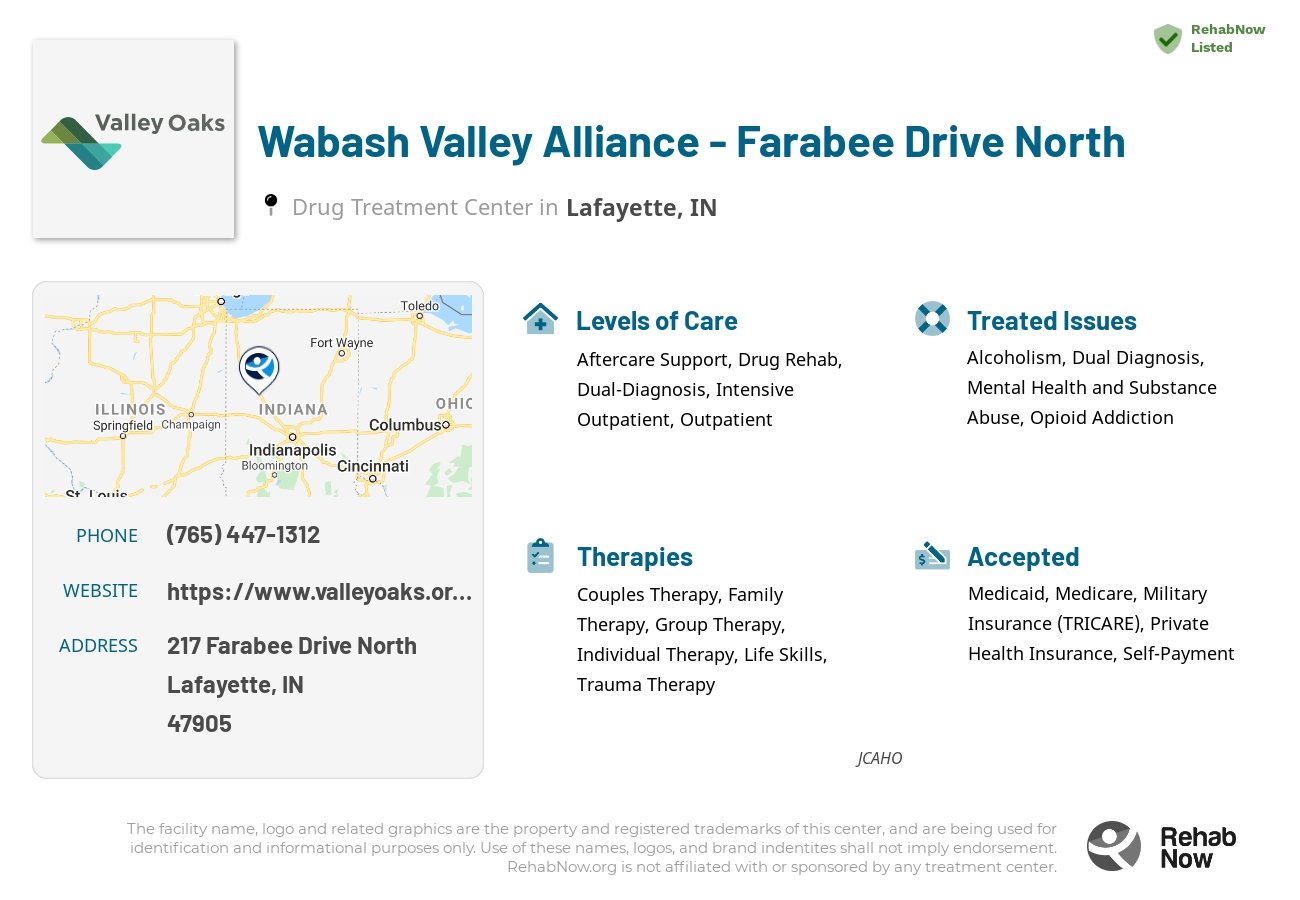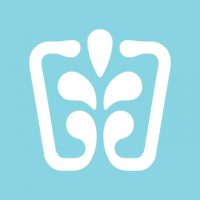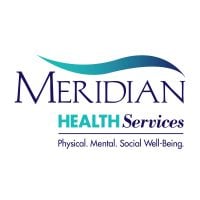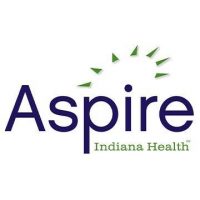Wabash Valley Alliance - Farabee Drive North
Drug Rehab Center in Lafayette, Indiana
Wabash Valley Alliance - Farabee Drive North in Lafayette, Indiana is a premier addiction treatment facility and mental health services provider offering a full range of individualized, evidence-based treatment and supportive services in a compassionate, recovery-oriented environment.
About Wabash Valley Alliance - Farabee Drive North in Indiana
Wabash Valley Alliance - Farabee Drive North is an Addiction Treatment Facility located in Lafayette, Indiana. Established in 1938, this facility offers assistance to individuals suffering from alcoholism, dual diagnosis, opioid addiction, and drug addiction. They provide various levels of care, including aftercare support, drug rehab, dual-diagnosis treatment, intensive outpatient programs, and outpatient services. Wabash Valley Alliance - Farabee Drive North is accredited by the Joint Commission on Accreditation of Healthcare Organizations (JCAHO), ensuring that they meet rigorous standards of quality and safety in their addiction treatment programs. They also accept private health insurance, making their services accessible to a wider range of individuals seeking treatment.
Wabash Valley Alliance - Farabee Drive North in Lafayette, Indiana is dedicated to providing comprehensive addiction treatment services to those in need. Their facility offers specialized care for individuals dealing with alcoholism, opioid addiction, and drug addiction. Through their aftercare support programs, patients receive continued assistance and guidance even after completing their initial treatment. With their dual-diagnosis treatment approach, they address both addiction and any underlying mental health issues that may contribute to substance abuse. Their intensive outpatient programs and outpatient services provide flexible options for individuals seeking treatment while maintaining their daily responsibilities. The accreditation by JCAHO ensures that Wabash Valley Alliance - Farabee Drive North adheres to the highest standards of quality and safety. Furthermore, they accept private health insurance, making their services more accessible for those seeking addiction treatment.
Genders
Ages
Modality
Additional
Accreditations

JCAHO
Conditions and Issues Treated
Opioid addiction has become a significant health problem in the United States. In 2015, there were 91 opioid overdose-related deaths per day, with a substantial increase in mortality rate in 2014.
When opioid addiction has reached a point where a person’s life becomes unmanageable, treatment options are available to help them get sober. Treatment that includes medical care with medications and counseling can help a user transition into sobriety.
When someone in struggles with both addiction and mental or emotional illness, this is considered a dual diagnosis. Dual diagnosis treatment can include therapy for these issues to happen simultaneously, which will allow either of them to be treated effectively.
Sometimes people who have suffered from addiction disorder also suffer from co-occurring disorders such as depression, anxiety, bipolar disorder, etc., making them “dual diagnoses.” Dual diagnoses require specialized treatment programs where drug and alcohol addiction are addressed along with psychiatric illnesses. Some rehabilitation facilities provide patients suffering from cooccurrences a program with highly integrated services and a clean environment with few distractions to help them succeed.
Levels of Care Offered
This center offers a variety of custom treatment tailored to individual recovery. Currently available are Aftercare Support, Drug Rehab, Dual-Diagnosis, Intensive Outpatient, Outpatient, with additional therapies available as listed below.
The Intensive Outpatient Program offered by Wabash Valley Alliance - Farabee Drive North is designed for those who need intensive care but would rather get it in the comfort of their own home. The treatment programs vary in duration and intensity and can be tailored to suit the patient’s needs. The program includes regular visits to the facility, though the overnight stay is not needed. IOP is suitable for patients who have been treated in residential treatment programs and are in the transition phase. It helps the patient live at home and discharge some work or school responsibilities even while undergoing treatment. The patients gradually get back to their routine life with the support of a friend or family member.
Outpatient treatment is often used for drug addicts in drug rehab. Outpatient treatment consists of counseling and therapy sessions. This form of treatment is also called ‘day-treatment’. The outpatient treatment process begins with the addict’s initial detox period, lasting about ten days.
Outpatient treatment is used for those who are at moderate risk for ‘slipping back’ into the addiction, for those who:
- Are not currently experiencing any side effects from withdrawal and can handle social pressure
- Can handle stressors that might trigger relapse
- Have a stable living environment or have moved out of their previous environment, which was not conducive to being sober
- Have a support system that allows them to go to a facility a few times a week while still keeping their current responsibilities
- Have no legal obligations, being either on parole or probation, that require them to seek treatment at a mandatory facility
- Are not currently experiencing any side effects from withdrawal and can handle social pressure
- Have a stable living environment or have moved out of their previous environment, which was not conducive to being sober
Completing a drug or alcohol rehab program is only the first step. Then comes aftercare support. These services include sober living accommodations, career counseling, and AA/NA programs for those struggling with sobriety or who want help maintaining it after initial rehab at an addiction facility.
They can last up to a year or more depending on what’s needed most urgently after the earlier stages are completed.
Therapies & Programs
Because no single treatment is effective for all addicts, the goal of treatment and therapy should be to figure out what works best for each individual. Tolerance and withdrawal levels differ from person to person, affecting the treatment intensity required. Addiction treatment should aim to help addicts develop healthy coping mechanisms for dealing with their addiction and its underlying causes.
Couples therapy works with clients and significant others in a professional capacity to improve relationship dynamics. This can be helpful for addicts who are trying to marry the idea of recovery into their work, family, social lives – any aspect that has to do with relationships. Through counseling sessions, addicts will have an opportunity to talk about their addiction with professional partners.
Family therapy is beneficial for people who are in addiction treatment services because it offers addicts the opportunity to work with their family members to better understand what led them to make choices that contributed to their addiction.
This type of therapy helps family members reach a deeper understanding of how they can best support their loved one during recovery. It also helps the addict better understand their own motivations and triggers that led them to turn to substance abuse.
Family therapy can help addicts in the following ways:
- Assists family members in processing difficult feelings so they don’t blame or resent recovering addicts
- Assists family members in understanding how addiction has impacted the addict and everyone who is involved with them
- Allows the addict to take responsibility for their actions, while encouraging improved communication skills
- Helps family members understand how to best support an individual in recovery so addicts don’t relapse again.
Group therapy can help build a stronger support system and give addicts in Lafayette, IN insight into their addiction that they gain through shared conversations. Group therapy occurs in a controlled group environment, exclusive of one on one meetings. This makes it safer for patients to feel comfortable sharing the struggles they’re going through and gaining perspective.
Trauma therapy is beneficial for people who are recovering from drug addiction because it helps them heal from past traumas that may have caused them to turn to harmful substances or led them to experience negative emotions that contributed to their destructive behaviors.
This type of treatment works by processing difficult experiences so individuals can learn how to process these events without having to turn to substances for coping.
Trauma therapy can help addicts in the following ways:
- Helps individuals understand their experiences and emotional responses to difficult events, including why they turned to drugs or alcohol
- Provides them with comfort and support while working through difficult emotions related to these traumatic experiences
- Offers an opportunity for addicts to have a voice and be heard, which can improve their self-esteem
- Can help them develop coping skills so they can better respond to triggers instead of turning to substance abuse.
Life Skills Services assist addicts in their recovery by teaching them healthy coping mechanisms that will aid them in becoming sober, focussing on helping people enter into, and maintaining long-term sobriety. Drug Treatment Centers provide Life Skills Services at varying levels of intensity, specific to the needs and requirements of each patient.
The benefits of Life Skills Services offered at Wabash Valley Alliance - Farabee Drive North:
- Restores hope and empowerment — Helps addicts believe that recovery is possible and instills a new confidence in their ability to achieve a positive, drug-free future
- Enhances family involvement — Encourages families to get involved in the recovery process and supports their understanding and encouragement of healthy behavior.
- Increases patient’s compliance — Helps patients take responsibility for and ownership of their recovery and encourages continued progress
- Reduces relapse rates — Encourages long-term abstinence and emphasizes the importance of establishing sober support systems.
Payment Options Accepted
For specific insurance or payment methods please contact us.
Is your insurance accepted?
Ask an expert, call (888) 674-0062
Wabash Valley Alliance Associated Centers
Discover treatment facilities under the same provider.
- Wabash Valley Alliance - 610 Main Street in Lafayette, IN
- Wabash Valley Alliance - Rensselaer in Rensselaer, IN
- Wabash Valley Alliance - Attica in Attica, IN
- Wabash Valley Alliance - Crawfordsville in Crawfordsville, IN
- Wabash Valley Alliance - Delphi in Delphi, IN
Learn More About Wabash Valley Alliance Centers
Additional Details
Specifics, location, and helpful extra information.
Lafayette, Indiana 47905 Phone Number(765) 447-1312 Meta DetailsUpdated November 25, 2023
Staff Verified
Wabash Valley Alliance - Farabee Drive North Patient Reviews
There are no reviews yet. Be the first one to write one.
Lafayette, Indiana Addiction Information
The state of Indiana ranks 14th in the nation for drug abuse, but 17th for drug overdoses. The state has many high-quality rehabilitation centers, but reports show that there are about 20 deaths per 100,000 people. This is due to its location making it a drug trafficking haven, where many drugs are further distributed into the country.
Lafayette, Indiana, has a worse drug abuse problem. The percentage of people aged 12 and older who reported using an illicit drug was 9.5 in Lafayette. This means a higher than average rate of drug abuse in Lafayette. Of those 1,946 drug overdose deaths, 1,416 (73%) were due to opioids. There are many support groups and rehab centers that can help you get your life back on track.
Treatment in Nearby Cities
- Rockport, IN (175.8 mi.)
- Kendallville, IN (108.9 mi.)
- Evansville, IN (173.7 mi.)
- Decatur, IN (104.8 mi.)
- Logansport, IN (34.8 mi.)
Centers near Wabash Valley Alliance - Farabee Drive North
The facility name, logo and brand are the property and registered trademarks of Wabash Valley Alliance - Farabee Drive North, and are being used for identification and informational purposes only. Use of these names, logos and brands shall not imply endorsement. RehabNow.org is not affiliated with or sponsored by Wabash Valley Alliance - Farabee Drive North.





